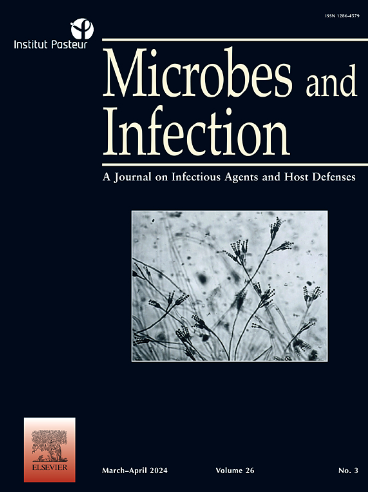Kinetic and proteomic studies in milk show distinct patterns among major Listeria monocytogenes clones
IF 2.7
4区 医学
Q3 IMMUNOLOGY
引用次数: 0
Abstract
Listeria monocytogenes, a contaminant of raw milk, includes hypervirulent clonal complexes (CC) like CC1, CC4, and CC6, highly overrepresented in dairy products when compared to other food types. Whether their higher prevalence in dairy products is the consequence of a growth advantage in this food remains unknown. We examined growth kinetics of five L. monocytogenes isolates (CC1, CC4, CC6, CC9, and CC121) at 37 and 4 °C in ultra-high temperature (UHT) milk and raw milk. At 4 °C, hypovirulent CC9 and CC121 isolates exhibit better growth parameters in UHT milk compared to the hypervirulent CC1, CC4, and CC6 isolates. CC9 isolate in raw milk at 4 °C exhibited the fastest growth and the highest final concentrations. In contrast, hypervirulent isolates (CC1, CC4, and CC6) displayed better growth rates in UHT milk at 37 °C, the mammalian host temperature. Proteomic analysis of representative hyper- (CC1) and hypovirulent (CC9) isolates showed that they respond to milk cues differently with CC-specific traits. Proteins related to metabolism (such as LysA or different phosphotransferase systems), and stress response were upregulated in both isolates during growth in UHT milk. Our results show that there is a Listeria CC-specific and a Listeria CC-common response to the milk environment. These findings shed light on the overrepresentation of hypervirulent L. monocytogenes isolates in dairy products, suggesting that CC1 and CC4 overrepresentation in dairy products made of raw milk may arise from contamination during or after milking at the farm and discard an advantage of hypervirulent isolates in milk products when stored at refrigeration temperatures.
牛奶中的动力学和蛋白质组学研究显示,主要李斯特菌克隆之间存在不同的模式。
单核细胞增生李斯特菌是生牛奶中的一种污染物,其中包括 CC1、CC4 和 CC6 等超病毒克隆复合体(CC),与其他类型的食品相比,它们在乳制品中的比例很高。它们在乳制品中的高流行率是否是在这种食品中具有生长优势的结果,目前仍不得而知。我们研究了五种单核细胞增多性乳酸杆菌分离物(CC1、CC4、CC6、CC9 和 CC121)在超高温(UHT)牛奶和生奶中 37 ℃ 和 4 ℃ 的生长动力学。与高致病力的 CC1、CC4 和 CC6 分离物相比,低致病力的 CC9 和 CC121 分离物在 4 ℃ 超高温灭菌奶中的生长参数更好。CC9 分离物在 4 ℃ 的生乳中生长最快,最终浓度最高。相比之下,超病毒分离物(CC1、CC4 和 CC6)在 37 °C(哺乳动物宿主温度)超高温灭菌奶中的生长速度更快。对具有代表性的高病毒分离物(CC1)和低病毒分离物(CC9)进行的蛋白质组分析表明,它们对牛奶线索的反应不同,具有CC特异性。在超高温灭菌奶中生长期间,两种分离物中与新陈代谢(如 LysA 或不同的磷酸转移酶系统)和应激反应有关的蛋白质都出现了上调。我们的研究结果表明,李斯特菌 CC 对牛奶环境有特异性和共通性反应。这些发现揭示了乳制品中超病毒性单核细胞增生李斯特菌分离物比例过高的问题,表明生乳制成的乳制品中CC1和CC4比例过高可能是由于在牧场挤奶期间或挤奶后受到污染造成的,在冷藏温度下储存时,超病毒性分离物在乳制品中的优势就会消失。
本文章由计算机程序翻译,如有差异,请以英文原文为准。
求助全文
约1分钟内获得全文
求助全文
来源期刊

Microbes and Infection
医学-病毒学
CiteScore
12.60
自引率
1.70%
发文量
90
审稿时长
40 days
期刊介绍:
Microbes and Infection publishes 10 peer-reviewed issues per year in all fields of infection and immunity, covering the different levels of host-microbe interactions, and in particular:
the molecular biology and cell biology of the crosstalk between hosts (human and model organisms) and microbes (viruses, bacteria, parasites and fungi), including molecular virulence and evasion mechanisms.
the immune response to infection, including pathogenesis and host susceptibility.
emerging human infectious diseases.
systems immunology.
molecular epidemiology/genetics of host pathogen interactions.
microbiota and host "interactions".
vaccine development, including novel strategies and adjuvants.
Clinical studies, accounts of clinical trials and biomarker studies in infectious diseases are within the scope of the journal.
Microbes and Infection publishes articles on human pathogens or pathogens of model systems. However, articles on other microbes can be published if they contribute to our understanding of basic mechanisms of host-pathogen interactions. Purely descriptive and preliminary studies are discouraged.
 求助内容:
求助内容: 应助结果提醒方式:
应助结果提醒方式:


